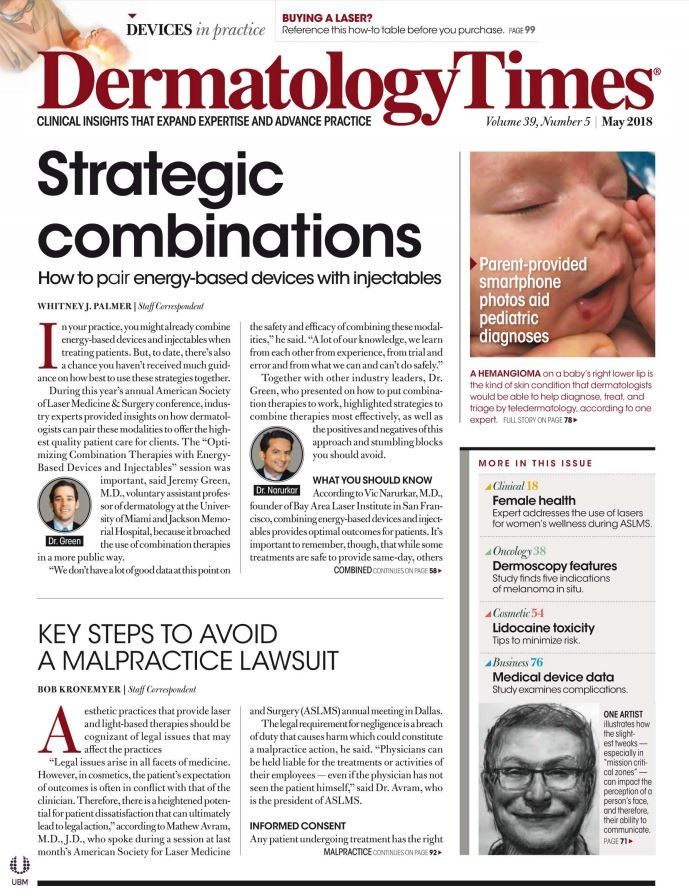- Case-Based Roundtable
- General Dermatology
- Eczema
- Chronic Hand Eczema
- Alopecia
- Aesthetics
- Vitiligo
- COVID-19
- Actinic Keratosis
- Precision Medicine and Biologics
- Rare Disease
- Wound Care
- Rosacea
- Psoriasis
- Psoriatic Arthritis
- Atopic Dermatitis
- Melasma
- NP and PA
- Skin Cancer
- Hidradenitis Suppurativa
- Drug Watch
- Pigmentary Disorders
- Acne
- Pediatric Dermatology
- Practice Management
- Prurigo Nodularis
- Buy-and-Bill
Publication
Article
Dermatology Times
FDA approves a new, more powerful psoriasis drug
Author(s):
“As we move toward finding a cure for psoriasis, what we are looking for are high performance drugs that provide durable response in between treatments and that lend themselves to patient compliance,” says Dr. George Martin.
The U.S. Food and Drug Administration has approved tildrakizumab-asmn (Ilumya, Sun Pharma) for adults with moderate-to-severe plaque psoriasis (PsO) who are candidates for systemic therapy or phototherapy, according to a company announcement.
Tildrakizumab-asmn could be available in the U.S. by as early as this summer.
Like guselkumab (Tremfya, Janssen) and ustekinumab (Stelara, Janssen), tildrakizumab-asmn is an IL-23 inhibitor that has been shown to reduce inflammation in adult patients with PsO (ustekinumab is also an IL-12 inhibitor). It works by selectively binding to the p19 subunit of IL-23 where it inhibits the release of pro-inflammatory cytokines and chemokines.
Data from two randomized, double-blind, placebo-controlled phase three clinical trials of 926 patients showed that of 616 treated patients (310 received a placebo), a statistically significant number of patients from both studies met the primary endpoint of PASI 75 and the Physician’s Global Assessment (PGA) score of clear or minimal at 12 weeks after two treatments. The results were presented at the European Academy of Dermatology and Venereology (EADV) Congress last year and published in The Lancet.
reSURFACE 1 Study
(NCT01722331)
reSURFACE 2 Study
(NCT01729754)
ILUMYA 100 mg
n=309
Placebo
n=154
ILUMYA 100 mg
n=307
Placebo
n=156
(Study data as cited by Sun Pharmaceuticals.)
Of patients in the first trial, reSURFACE 1, 74 percent achieved PASI 75 at week 28 after three doses. “84 percent of patients who continued receiving ILUMYA 100 mg maintained PASI 75 at week 64 compared to 22 percent of patients who were re-randomized to placebo. In addition, 69 percent of the patients receiving ILUMYA 100 mg who had a PGA score of clear or minimal at week 28 maintained this response at week 64 compared to 14 percent of patients who were re-randomized to placebo,” Sun Pharma reported.
Researchers reported that in terms of serious adverse events, angioedema and urticaria were reported in some patients. Other adverse events included upper respiratory infections, injection site reactions and diarrhea. Adverse reactions that occurred at rates less than 1 percent but greater than 0.1 percent in the treatment group at a higher rate than in the placebo group, included dizziness and pain in extremities and urticaria.
Tildrakizumab-asmn is administered subcutaneously at 100 mg every 12 weeks, after the completion of initial doses at the first week and week four.
“As we move toward finding a cure for psoriasis, what we are looking for are high performance drugs that provide durable response in between treatments and that lend themselves to patient compliance - in this case 12 weeks. This lessens the need for multiple injections along the way,” said George Martin, M.D., in a statement issued by the National Psoriasis Foundation where he serves as a member of its medical board.
REFERENCE
“Sun Pharma Announces U.S. FDA Approval of ILUMYA™ (tildrakizumab-asmn) for the Treatment of Moderate-to-Severe Plaque Psoriasis,” Sun Pharma news release issued March 21, 2018.







